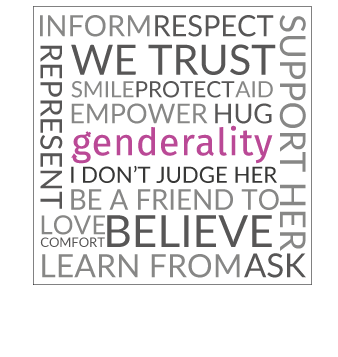News
News, information and opinion on genderality.
Read more >>
How to get involved
“Online violence against women is an overt expression of the gender discrimination and inequality that exists offline. Online, it becomes amplified.” – Jac sm Kee.
Read more >>
Our Story
Genderality is a campaign responding to gender-based discrimination and violence online and the “real” consequences of our “virtual” actions. Our position is that you are you, and you are free to be you. Your virtual identity is no less important than your real identity – so build it, nurture it, be you. All too often, the virtual world becomes a platform for abuse, and one with impunity. We are here to combat that – and that is why we are reaching out to you.
Women are online. All around the world, women socialize online, enjoy entertainment online – women conduct business online. As such, women cannot, nor should they have to, avoid this indispensable and desirable aspect of their lives in order to not experience discrimination.
Crucial to understanding the issue is understanding the discrimination and violence against women that can be committed online. Consider how you are active online: you may have ordered a gift for a friend, or even made that friend through an online community. You may have applied to your university or job online. Or researched and planned a summer vacation, and then shared pictures from that vacation. You may even be advocating for a cause that is important to you via social media.
What if you shared your idea for the gift with another person who deemed it a “stupid” idea, and belittled you for having “irresponsibly” spent so much money on it? What if the friend you met online wasn’t who s/he said s/he was and began cyberstalking you – or following you on the street? What if the admissions or hiring executive searched for you on Facebook and found photographs from a party at which you appeared not as you would professionally? What if someone began writing negative comments about you on your photos, and referring to you with slurs? Or calling for others to harm you because of the way you, as a woman, are dressed? What if you arranged to stay at a house abroad and upon arrival the house’s owner took advantage of you? Have you ever been harassed or threatened for expressing your opinion, or physically attacked for taking that stance? Such acts can be criminal – women have rights, and these rights must also be effectively protected in the virtual world.


